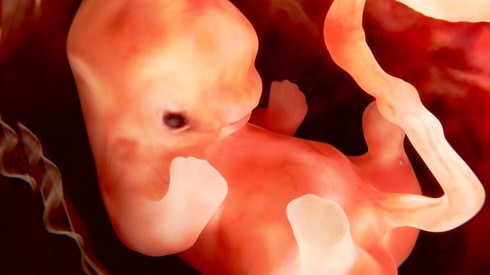Speaking Up to Defend Life
By Scott Klusendorf
You don’t need a graduate degree to defend the pro-life position. And you can do it effectively in one minute or less.
You don’t need a graduate degree to defend the pro-life position. And you can do it effectively in one minute or less.
Contents
Part One
Part One
Part Two
Part Two
Part Three
Part Three
Part One
Speaking Up to Defend Life
You thought this would be a typical family get-together, but right now you’re sweating bullets.
Everything was going well until Aunt Betty decided to challenge you from across the dinner table: “Tell me why you are pro-life. Why would anyone believe like you do?”
You’ve just been called out in front of the entire extended family. And Aunt Betty isn’t just asking for your opinion. She’s got Christianity itself in her crosshairs. She wants to know if your faith is tough enough to cut it in the real world – and you only have a minute or so to give her something to think about before dessert is served.
Make your pro-life case in one minute or less
You don’t need a graduate degree to say something persuasive. You just need to be clear and on point. Get your stopwatch ready, because I’m about to give you a one-minute case for the pro-life position that works with your skeptical Aunt Betty or even a reporter for the local news. Then, I’ll show you how to defend it.
Here’s your one-minute soundbite:
“Aunt Betty, I am pro-life because the science of embryology establishes that from the earliest stages of development, you were a distinct, living and whole human being. You weren’t part of another human being like skin cells on the back of my hand; you were already a whole living member of the human family even though you had yet to mature.
“There is no essential difference between the embryo you once were and the adult you are today that somehow justifies killing you at that earlier stage of development. Differences of size, level of development, environment and degree of dependency are not good reasons for saying you could be killed then but not now.”
Did you time it? I did. I made that pro-life case in 48 seconds. And you can, too!

But can you defend it?
Yes, you can! And you can do it with three easy steps. Remember: Your job isn’t to close the deal. Ultimately, it’s God who changes hearts and minds. Your job, writes apologist Greg Koukl, is to “put a pebble in their shoe.” That is, give them something to think about that will wear on them until the stop to deal with it.Step 1: Define your terms
Abortion is the intentional killing of a human fetus. This definition begs no questions and is generally agreed upon by many in the debate. (source)
Step 2: Set the ground rules
Arguments don’t have gender. People do. There is no such thing as a “woman’s perspective” on abortion that trumps all rational inquiries into the subject. Indeed, many feminists – let alone women in general – don’t even agree on the issue. For example, feminist Naomi Wolf calls abortion “a real death,” while feminist Katha Pollitt thinks it’s no different than vacuuming out your house!
In short, gender is irrelevant. What matter are the arguments that must be advanced and defended.
Step 3: Make your case
The pro-life argument cannot be dismissed as “religious,” though secularists will often try to paint it that way. Arguments are either true or false; valid or invalid. As philosopher Francis J. Beckwith points out, calling an argument “religious” is a category error like asking, “How tall is the number 5?”
In short, it’s not enough for critics to dismiss our case. They must do the hard work of refuting it.
Watch pro-life apologist Scott Klusendorf give a compelling defense for the value of pre-born life and encourages listeners to share the truth about abortion on Focus on the Family’s broadcast.
Share:Watch pro-life apologist Scott Klusendorf give a compelling defense for the value of pre-born life and encourages listeners to share the truth about abortion on Focus on the Family’s broadcast.
Share on facebook
Share on twitter
Share on pinterest
Share on email
Part Two
How Science Supports the Pro-Life Position
The science of embryology affirms the humanity of the preborn, and defenders of abortion concede the inhumanity of the procedure. Simply put, support for the pro-life position is strong.
Premise 1:
It is morally wrong to intentionally kill an innocent human being.
Premise 2:
Abortion intentionally kills an innocent human being.
Conclusion:
Abortion is morally wrong.
The science of embryology establishes that from the earliest stages of development, the unborn are distinct, living and whole human beings. They are distinct. (Meaning they are not part of another human being.) They are living. (Dead things don’t grow!) And they are whole. (Sure, they have yet to grow and mature, but the kind of thing they are is not in question.) Human parents produce human offspring.
Leading embryology textbooks affirm this. For example, in The Developing Human: Clinically Oriented Embryology, Keith L. Moore and T.V.N. Persaud write: “A zygote is the beginning of a new human being. Human development begins at fertilization, the process during which a male gamete or sperm … unites with a female gamete or oocyte … to form a single cell called a zygote. This highly specialized, totipotent cell marks the beginning of each of us as a unique individual.”
T.W. Sadler’s Langman’s Embryology states that the development of a human begins with fertilization, in which the male sperm and the female oocyte “unite to give rise to a new organism, the zygote.”
Embryologists Ronan O’Rahilly and Fabiola Müller write, “Although life is a continuous process, fertilization is a critical landmark because, under ordinary circumstances, a new, genetically distinct human organism is thereby formed.”

Telling the truth
Many contemporary defenders of abortion agree that we can know when life begins.
For example, in his book Practical Ethics, Princeton University bioethicist Peter Singer – a supporter of both abortion and infanticide – writes: “Whether a being is a member of given species is something that can be determined scientifically, by an examination of the nature of the chromosomes in the cells of living organisms. In this sense, there is no doubt that from the first moments of its existence an embryo conceived from human sperm and eggs is a human being.”
That elective abortion kills a living human being is actually conceded by many who perform and defend the practice.
Dr. Warren Hern, author of Abortion Practice – the medical textbook that teaches abortion procedures – told a Planned Parenthood conference: “We have reached a point in this particular technology [D&E abortion] where there is no possibility of denying an act of destruction. It is before one’s eyes. The sensations of dismemberment flow through the forceps like an electric current.”
Liberal professor Ronald Dworkin, in his book Life’s Dominion, writes that abortion deliberately kills a developing embryo and is a choice for death.
We’ve known these facts for years, despite attempts to hide them. As far back as 1970, an editorial in California Medicine conceded the scientific ground to pro-lifers. The authors – sympathetic to abortion – note that language can be used to get around inconvenient truths: “[T]he scientific fact, which everyone really knows, [is] that human life begins at conception and is continuous whether intra- or extra-uterine until death. The very considerable semantic gymnastics which are required to rationalize abortion as anything but taking a human life would be ludicrous if they were not often put forth under socially impeccable auspices.”

Naomi Wolf, a prominent feminist and author, defends graphic depictions of abortion in a New Republic article. In it, she warns fellow abortion supporters to stop lying: “Clinging to a rhetoric about abortion in which there is no life and no death, we entangle our beliefs in a series of self-delusions, fibs and evasions. And we risk becoming precisely what our critics charge us with being: callous, selfish and casually destructive men and women who share a cheapened view of human life. … [We] need to contextualize the fight to defend abortion rights within a moral framework that admits that the death of a fetus is a real death.”
Feminist Camille Paglia is even more blunt: “I have always frankly admitted that abortion is murder, the extermination of the powerless by the powerful. Liberals for the most part have shrunk from facing the ethical consequences of their embrace of abortion, which results in the annihilation of concrete individuals and not just clumps of insensate tissue.”
Simply put, support for the pro-life position is strong.
The science of embryology affirms the humanity of the unborn.
Contemporary defenders of abortion concede the inhumanity of the procedure.
You can move forward in defending life with confidence!
Share:
Share on facebook
Share on twitter
Share on pinterest
Share on email
Part Three
Why is Abortion Wrong?
There is no morally significant difference between the embryo you once were and the adult you are today.
Philosopher David Boonin, author of A Defense of Abortion, writes: “A human fetus, after all, is simply a human being at a very early stage in his or her development.”
That raises an important philosophical question: Given the humanity of the unborn, does each and every human being have an equal right to life? Or do only some have it based on some characteristic that may come and go within the course of their lifetimes?
Pro-life advocates contend there is no morally significant difference between the embryo you once were and the adult you are today that would justify killing you at that earlier stage of development. Differences of size, level of development, environment and degree of dependency are not good reasons for saying you had no right to life then but you do now.
Author Stephen Schwarz developed the acronym SLED as a helpful reminder of these non-essential differences:
Size: You were smaller as an embryo, but since when does your body size determine value?
Level of Development: It’s true that you were less developed as an embryo, but 6-month-olds are less physically and mentally developed than teenagers, and we don’t argue that we can kill them.
Environment: Where you are located has no bearing on what you are. How does a journey of 8 inches down the birth canal change the essential nature of the unborn from a being we can kill to one we can’t?
Degree of Dependency: Sure, you depended on your mother for survival while in the womb, but since when does dependence on another human mean we can kill you? (Consider conjoined twins, for example.)
The S.L.E.D. Test: How to Talk About Why You’re Pro-Life and Not Pro-Abortion

In short, humans are equal by nature, not function. Although they differ immensely in their respective degrees of development, they are nonetheless equal because they share a common human nature – and they had that human nature from the moment they began to exist.
If I am wrong about this, then human equality is a fiction. Think, for a moment, about your 10 closest friends. Would you agree that each of them has the same basic rights and that each should be treated equally? Yet if all of them should be treated equally, there must be some quality they all share that justifies that equal treatment.
What is that characteristic? Only this: We all have the same human nature.
We are all apologists now!
An apologist is not someone who runs around and says he’s sorry all the time. (That’s what husbands do!) Rather, an apologist is someone who makes a case for what he or she believes. Doing so is biblical. We are told in 1 Peter 3:15 to “always be prepared to make a defense” for the hope that is within us.
We are all apologists now. The abortion controversy is not about a surgical procedure. It’s about a far deeper question: Who counts as one of us?
When feminist Katha Pollitt writes that abortion “is a good thing for society” because it’s “good for everyone” if women only have the children they want, pro-lifers must step up and ask: Are the unborn part of that society? And does “everyone” include the unborn?
We can’t let critics get away with simply assuming the unborn aren’t valuable human beings. The pro-life argument thrives on its clarity. Simply stated, it is wrong to intentionally kill innocent human beings. Abortion intentionally kills an innocent human being. Therefore, abortion is wrong.
Now, step up and say it with confidence!
© 2017 by Scott Klusendorf. Used by permission.
Share:
Share on facebook
Share on twitter
Share on pinterest
Share on email
About the Author

Scott Klusendorf
Scott Klusendorf is the founder and president of the Life Training Institute which was established to equip pro-life advocates for defending their views in the public square. A passionate defender of pre-born children, Scott has participated in numerous debates with abortion advocates at the collegiate level, and he has lectured student groups at more than 80 colleges and universities including Stanford, U.C. Berkeley and M.I.T. Scott is the author of The Case for Life and the co-author of Stand for Life. He and his wife, Stephanie, have four children and reside in the Atlanta area.
More by Scott Klusendorf
The post Speaking Up to Defend Life appeared first on Focus on the Family.
Continue reading...





